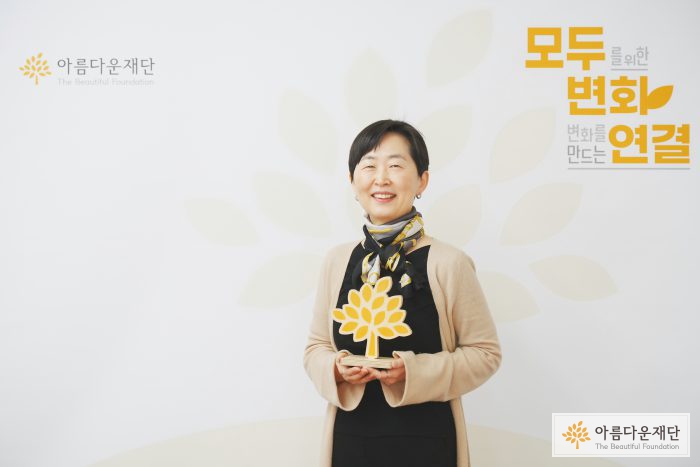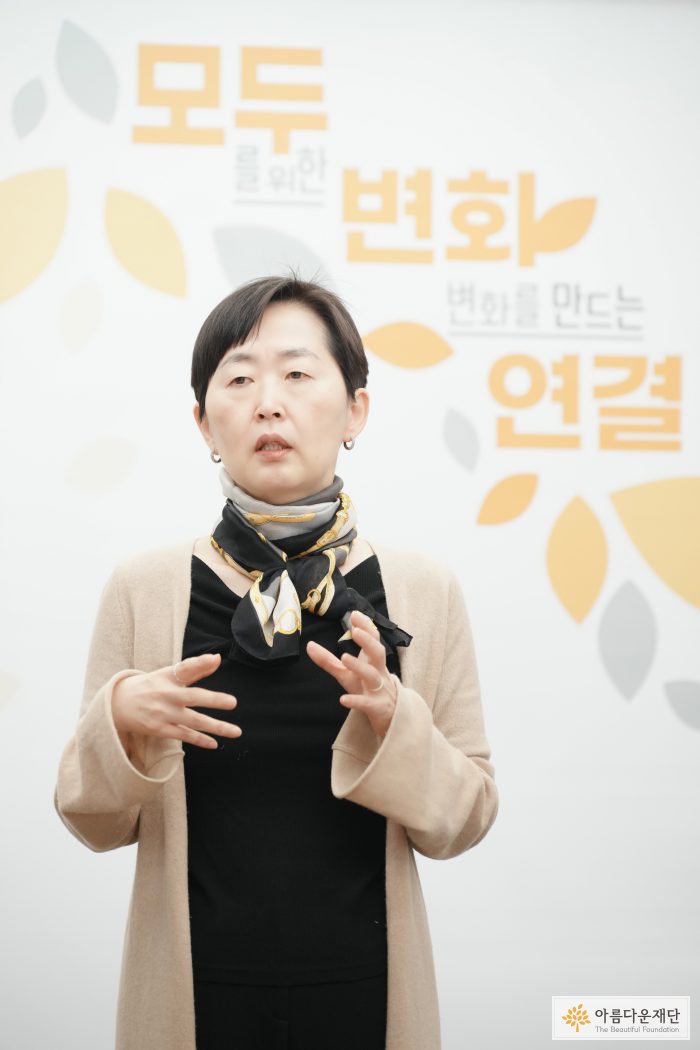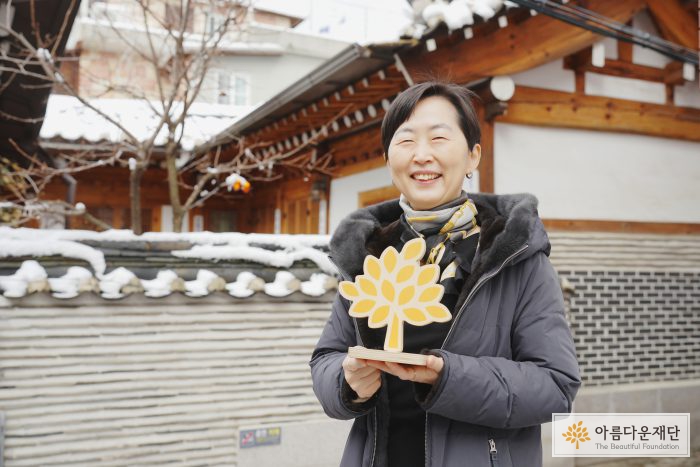|
This year, Professor Roh Yeon-hee of the Department of Social Welfare at Catholic University has been inaugurated as the new director of Center on Philanthropy at The Beautiful Foundation. As a researcher in donation and non-profit sector, she has maintained a 20-year relationship with the center since its initial encounter in 2004. Let’s dive into her thoughts on philanthropy and her future plans as a director of the center. |
Q: Congratulations on your inauguration as the director of Center on Philanthropy at The Beautiful Foundation. I heard that you started as a subcommittee and became the director after 20 years. Could you tell us about yourself and how you got involved with the center?
Thank you. I received my Ph.D. in Social Welfare at Case Western Reserve University in the year of 2001 and came back to Korea, where I began working as a professor in the Department of Social Welfare at Catholic University in 2003. The following year, in 2004, I was contacted by Center on Philanthropy at The Beautiful Foundation. The center was in need of a researcher in donation and non-profit sector and invited me to join. Since then, I have been conducting various research projects on donation, including Giving Korea, and have been closely collaborating with the center.

[Image: Professor Roh Yeon-hee, the newly appointed director of Center on Philanthropy at The Beautiful Foundation, smiling brightly.]
Q: For those unfamiliar, could you briefly introduce what Center on Philanthropy does?
Center on Philanthropy is the first research institute in Korea dedicated to studying philanthropy. Through research, presentation, and domestic/international exchanges, the center has contributed to the spread of a mature culture of donation in Korean society. The research focuses on understanding why people donate, how to strengthen donation behavior, and ensuring the proper use of donated funds, among other topics. One of the flagship research projects is ‘Giving Korea.’
Q: I did hear that Giving Korea is a significant research project of Center on Philanthropy. What is Giving Korea?
Started in 2001, Giving Korea is a flagship project that creates one of Korea’s leading donation indices by surveying citizens’ donation behavior and perceptions. Using data such as donation participation rates, average donation amounts, donation destinations, and methods, we calculate an international donation index to gauge the state of donation activities. Recognized by the Statistics Korea to the extent that Giving Korea’s survey questions have been adopted, it is the third oldest donation index in global. Since 2015, we have been conducting biennial surveys on individual donations and corporate donations, followed by surveys on nonprofit organizations and individual donations after the 2016 revision. Additionally, we continue our efforts to track trends in domestic philanthropy by releasing annual analysis results and raw data, as well as hosting a symposium to benefit both practitioners and researchers.
Q: I’m curious about what Korea’s philanthropy looks like based on the results of Giving Korea surveys.
According to Giving Korea’s research findings, about half of Koreans have experience in donation. Based on data from a survey of 2,500 individuals conducted by Center on Philanthropy, the donation participation rate among Koreans was approximately 61% in 2021. Despite the crisis of COVID-19, Koreans actively extended helping hands to others. This indicates that Koreans have a strong sense of community and solidarity, which suggests that there is great potential for developing our unique culture of sharing more than any other country in the world. Many individuals aspire to promote community and social solidarity through donations.
Q: If someone asks, “Why should I donate?” then what would you say?
I will have to answer that from a researcher’s perspective. First, donation is an act of kindness. As I interact with donors and conduct surveys, I found out that they have altruistic intentions. Second, donation is a voluntary action without coercion. Survey results show that donors give voluntarily and derive significant joy from their actions. Donors tend to have higher levels of life satisfaction and trust in society. Third, donation is instinctual. Humans have an innate desire to do something for others, and donation is one of the ways to express that instinct.
Q: You are inaugurated as the director of Center on Philanthropy. Given your 20 years of research in philanthropy, it seems like a time to leverage your accumulated expertise. Could you share your thoughts on your inauguration and your future plans?
Reflecting on my inauguration as director and my 20 years of involvement with the center, I feel that the direction I’ve quietly pursued as a researcher in the field of social welfare aligns well with the mission of the center. I am deeply aware of the efforts, passion, and sense of mission of the activists and researchers who have led the center thus far. Rather than attempting a new challenge, I aspire to be a supportive partner in continuing the ongoing research projects successfully. The meaningful acts of sharing from donors have made our research and educational activities possible for a better society. I will strive to maintain existing research projects effectively and explore ways to foster a mature culture of philanthropy in Korean society.
Q: To those who contemplates donation, and the donors, do you have any message you would like to deliver?
As mentioned earlier, donation is an instinctive act of kindness for humanity and represents the highest form of voluntary action for individual and societal advancement. Donation brings unique happiness and satisfaction. As donors often say, “The quality of happiness derived from donation is different,” or “It’s the fastest way to happiness.” I encourage everyone to experience the unique joy of giving through donation.
Written by|김유진
Photo by|임다윤
Translated by|Minjung Chung


댓글 Comment